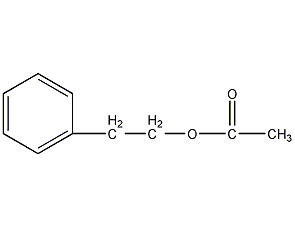2-Phenylethyl acetate 2-Phenylethyl acetate


Structural formula
| Business number | 02NL |
|---|---|
| Molecular formula | C10H12O2 |
| Molecular weight | 164.2 |
| label |
phenethyl acetate, Acetic acid phenethyl ester, Phenethyl acetate |
Numbering system
CAS number:103-45-7
MDL number:MFCD00008720
EINECS number:203-113-5
RTECS number:AJ2220000
BRN number:638179
PubChem number:24869676
Physical property data
1. Properties: Colorless liquid with honey-sweet rose aroma. Has a peach aroma.
2. Density (g/mL, 20℃): 1.0883
3. Relative vapor density (g/mL, air=1): Undetermined
4. Melting point (ºC): -31
5. Boiling point (ºC, normal pressure): 231-234
6. Boiling point (ºC, mmHg): Undetermined
p>
7. Refractive index (n20D): 1.5171
8. Flash point (ºC ): 105
9. Specific rotation (º): Undetermined
10. Autoignition point or ignition temperature (ºC): 480
11. Vapor pressure (mmHg, 20ºC): Undetermined
12. Saturated vapor pressure (kPa, ºC): Undetermined
13. Heat of combustion (KJ/mol): Undetermined
14. Critical temperature (ºC): Undetermined
15. Critical pressure (KPa): Undetermined
16. Oil and water (octanol/water) distribution Log value of coefficient: Undetermined
17. Explosion upper limit (%, V/V): Undetermined
18. Explosion lower limit (%, V/V): Undetermined
19. Solubility: Undetermined
Toxicological data
1. Skin/eye irritation: Standard Dresser test: Rabbit skin contact, 500mg/24HREACTION SEVERITY, slight reaction; 2. Acute toxicity: Rat oral LD50: 3670mg/kg; Rat inhalation LC50: >500mg/m3 ; The mouse passed the mouth LD50: 3670mg/kg; the rabbit skin contacts LD50: 6210mg/kg; the guinea pig passes the mouth LD50: 3670mg/kg;
Ecological data
This substance is slightly hazardous to water.
Molecular structure data
1. Molar refractive index: 46.84
2. Molar volume (cm3/mol): 158.7
3. Isotonic specific volume (90.2K ): 388.1
4. Surface tension (dyne/cm): 35.7
5. Dielectric constant:
6. Dipole moment (10-24cm3):
7. Polarizability: 18.56
Compute chemical data
1. Reference value for hydrophobic parameter calculation (XlogP): None
2. Number of hydrogen bond donors: 0
3. Number of hydrogen bond acceptors: 2
4. Number of rotatable chemical bonds: 4
5. Number of tautomers: none
6. Topological molecule polar surface area 26.3
7. Number of heavy atoms: 12
8. Surface charge: 0
9. Complexity: 137
10. Number of isotope atoms: 0
11. Determine the number of atomic stereocenters: 0
12. Uncertain number of atomic stereocenters: 0
13. Determine the number of chemical bond stereocenters: 0
14. Number of uncertain chemical bond stereocenters: 0
15. Number of covalent bond units: 1
Properties and stability
1. Avoid contact with strong oxidants.
2. Found in flue-cured tobacco leaves, burley tobacco leaves, and oriental tobacco leaves.
3. Naturally found in bananas, beer, butter oil, rose oil and other natural products.
Storage method
Store in a cool, ventilated warehouse. Keep away from fire and heat sources. should be kept away from oxidizer, do not store together. Equipped with the appropriate variety and quantity of fire equipment. The storage area should be equipped with emergency release equipment and suitable containment materials.
Synthesis method
1. Tobacco: BU, 56; OR, 57; FC, OR, 18; FC, 40; Synthesis: obtained by reacting acetic anhydride and phenylethyl alcohol in the presence of sodium acetate.
Purpose
1. Used in the preparation of soaps and daily cosmetics essences, and can be used as a substitute for methyl enanthioate.
2. Often used to prepare rose, orange blossom, violet, tuberose, wild rose and other flavors, as well as fruity flavors.
3. Also used in baked goods, puddings, and sweet sauces.
